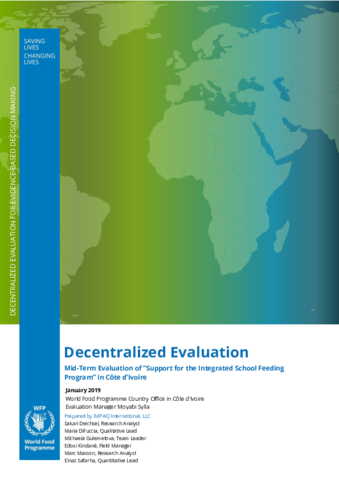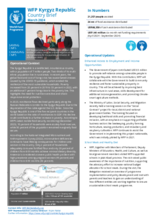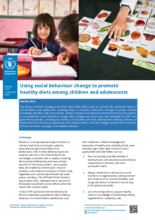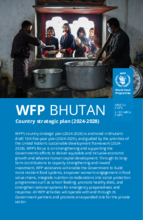
Findings and recommendations to inform new policies and country strategic plans.
This mixed-methods evaluation was commissioned by the WFP Country Office in Côte d'Ivoire and covered the period from September 2016 to June 2018. It was designed to evaluate the “Support for the Integrated School Feeding Program”, financed by the USDA’s McGovern-Dole (MGD) Program, against the following evaluation criteria: relevance, effectiveness, efficiency, impact, and sustainability.
The two main objectives of this mid-term evaluation were to:
- Assess and report on the progress made in achievement of the results, compared with the baseline, for the school meals project as it was implemented during the first two years.
- Assess and identify key achievements and challenges, draw lessons, and identify best practices for learning. It provides evidence-based findings to enlighten operational and strategic decision-making, improve in partnership coordination, and inform sustainability. Findings from this evaluation will be actively disseminated, and lessons will be incorporated into relevant lesson sharing systems.
Below is a sample of key evaluation findings:
- The project is highly integrated into and complements the government’s efforts. Beneficiaries agree that the food delivery, school improvements, and literacy activities aspects of the intervention are relevant to their needs.
- The absence of a regularly provisioned school canteen, seen as a major challenge which previously discouraged or prevented children from attending school or staying for the full day, was addressed under WFP’s MGD project according to the school management committees (COGES) and parents.
- Overall, the project is efficient as it provides beneficiaries with school meals, take home rations (THR), and literacy instruction.
- The impact analysis shows that the MGD intervention significantly improves the reading proficiency of students.
- While it is still early to fully assess the impact of the WPGs and whether this component of WFP’s sustainability plan is viable, the members of the most established WPGs which began receiving project support in 2017 have indicated that their work has started to have an effect.
Recommendations from the evaluation included:
- Strategically Reduce the Proportion of Canteen Days Covered in MGD Schools.
- Reinforce Directorate of School Canteens (DCS) and Directorate of Pedagogy and Continuing Education M&E Capacity at the National and Local Level.
- Improve Field Presence and Beneficiary Interaction.
- Increase Coordination, Communication, and Planning with the DCS.
- Reinforce Girls’ Education.
- Increase Female Representation in COGES.
- Strengthen COGES Capacity to Support MGD Activities.



